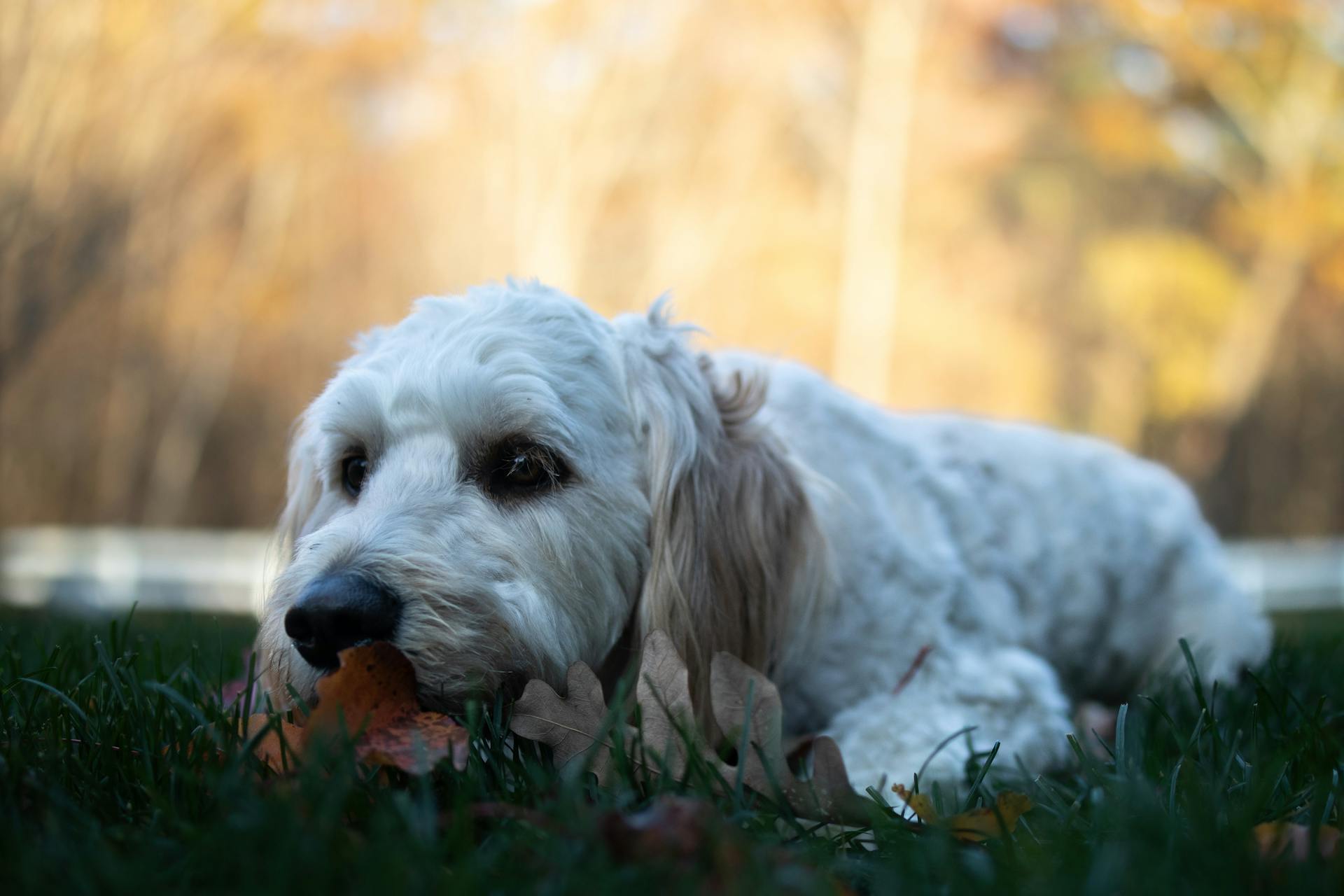
If you're considering boarding your dog, it's essential to do your research and recognize the signs of a bad facility. A reputable boarding facility should prioritize your dog's health and well-being.
You can spot a bad dog boarding facility by its unclean and unsanitary conditions. A facility with dirty cages, floors, and equipment is a red flag.
Dogs need regular exercise and socialization to stay happy and healthy. If you visit a boarding facility and see dogs cooped up in small spaces with little to no attention, it's a sign of neglect.
The American Society for the Prevention of Cruelty to Animals (ASPCA) recommends visiting a facility in person to get a sense of its cleanliness and treatment of animals. If the facility seems dirty or the staff seems uninterested in the dogs, it's a sign to look elsewhere.
If this caught your attention, see: Are Zoomies a Sign of a Happy Dog
Before Boarding
Before boarding, it's essential to discuss your dog's specific needs with the staff upfront. Transparency about your dog's health conditions or behavioral concerns is crucial for a smooth and safe boarding experience.
You should be prepared to share information about separation anxiety, resource-guarding, or illnesses that require close monitoring. This will help the boarding service determine if they can accommodate your dog's needs.
Discussing your dog's requirements with the staff allows you to get a sense of their experience and expertise in handling dogs with special needs. This conversation can also give you an idea of whether the boarding service is a good fit for your furry friend.
For more insights, see: Home Euthanasia Service for Dogs
Research and Preparation
Research and Preparation is key when finding a reliable kennel for your dog. A reputable kennel would have no problem letting you visit the dog runs, ask questions, and meet the employees.
You should be allowed to see where meals are prepared, along with the space where the dogs play. If a kennel seems disinterested in your pet, it's a red flag.
Don't be afraid to ask questions and observe the facility thoroughly. A well-run dog boarding service would be eager to show you everything, as it would have nothing to conceal.
Kennel Immunization Requirements
Kennel Immunization Requirements are in place to protect both your dog and the other dogs at the kennel. Many states require kennels to have proof of dogs' vaccination records to prevent outbreaks of life-threatening communicable diseases.
These diseases can be serious, including parvovirus, rabies, and distemper. Some kennels may also require additional vaccinations, such as Bordetella, also known as kennel cough.
To ensure your dog's safety, it's essential to ask about the kennel's immunization requirements. This includes asking for proof of basic annual vaccinations when registering your dog.
You should also ask how the kennel accommodates dogs with health conditions. This could be a dog with arthritis, who may need frequent playtime breaks and daily joint supplements at mealtimes.
Some kennels may have specific measures in place to ensure the overall health of their dogs. This could include regularly cleaning dogs' crates, spraying down communal play areas, and quarantining dogs with concerning symptoms.
Here are some key questions to ask about a kennel's immunization requirements:
- What vaccinations are required for your dogs?
- How often are the vaccination records reviewed and updated?
- What measures are in place to prevent the spread of disease?
- How do you accommodate dogs with health conditions?
Know the Difference Between Dog Boarding and In-Home Care
When finding a dog-sitter, you would ask many of the same questions you would a boarding service.
You can assess a sitter's experience, comfort level, and ability to visit your home multiple times a day.
Reading the comments other clients have left behind on apps like Rover or Wag! can give you an idea of a sitter's traits.
Everything takes place right in the comfort of your home with in-home care, so you don't have to worry about dropping off your dog at a kennel.
You can inquire about a dog-sitter's experience, comfort level, and ability to visit your home multiple times a day.
For more insights, see: My Dog Barks All Day While I Am at Work
How Dogs Handle Boarding
Dogs can thrive in boarding environments, enjoying playtime with other dogs and exploring new smells.
Some dogs, however, exhibit signs of stress and may shy away from staff members and other dogs.
Your dog's response to boarding is unique and may depend on their personality and temperament.
During a trial run with a potential kennel, you can observe how your dog responds to boarding and determine whether it's a good decision.
Leaving your dog for the first time can be a big adjustment, but finding a reliable kennel is essential for their comfort, safety, and well-being.
It's normal to have a range of feelings about leaving your dog behind, but with the right preparation and research, you can ensure their stay is a positive one.
A fresh viewpoint: Leaving Dog in Boarding for a Week
Choosing a Kennel
Choosing a kennel requires careful consideration to ensure your dog's comfort and well-being. A reputable kennel should have no problem letting you visit the dog runs, ask questions, and meet the employees.
You should be allowed to see where meals are prepared, along with the space where the dogs play. A well-run dog boarding service would be eager to show you everything, as it would have nothing to conceal.
Be wary of kennels that don't require immunization records, seem overbooked, or appear disinterested in your pet.
Finding Good Kennels
Finding a reliable kennel for your dog is crucial for their comfort, safety, and well-being. A reputable kennel should have no problem letting you visit the dog runs, ask questions, and meet the employees.
A well-run dog boarding service would be eager to show you everything, as it would have nothing to conceal. If they don't require immunization records, seem overbooked, or appear disinterested in your pet, it's a red flag.
Family, friends, your vet, groomer, or trainer are great places to start when searching for a kennel. You can also look on the Internet or through the Yellow Pages under "Kennels & Pet Boarding".
Your state, county, or city may require boarding kennel inspections, so be sure to ask about this or look for a current certificate or license. The Pet Care Services Association is a trade association that encourages professional standards in pet care.
It's a good idea to check with the Better Business Bureau for complaints about a kennel you're considering. A thorough check of the kennel's background is essential before making a decision.
Call the kennels on your list to see if they have space for your dog to meet your schedule. If possible, have your pet spend the day there or even sleep over before a long trip.
Take a look at this: Dog Boarding Kennels Prices
Hidden Fees: What to Expect

Hidden fees can sneak up on you, so it's essential to be aware of them. A respectable boarding facility should make their pricing and policies transparent.
Some facilities might charge extra for things like administering medication, providing special diets, or even just giving your pet a bath. These costs can add up quickly.
Be sure to ask about any hidden fees right from the start, so you're not caught off guard later on.
You might like: Why Is My Dog so Tired after Boarding?
Potential Red Flags
If you're searching for a dog boarding facility, be on the lookout for potential red flags. Lack of safety measures is a major concern, including chemicals within reach, holes in fences, aggressive dogs, and inadequate supervision.
A reputable kennel will require vaccination records to protect your dog and others. If they don't ask for these records, it's a sign to eliminate them from consideration. Safety certifications for staff and emergency procedures should also be in place.
Unsanitary conditions, such as strong odors or cloudy water, can indicate poor hygiene and a risk to your dog's health and happiness.
What to Look For

When evaluating a potential partner, look for red flags that indicate dishonesty. Dishonesty can manifest in various ways, including lying about their past or current life.
Be wary of excessive or overly flattering compliments, as they can be a sign of insincerity. This behavior can also be a tactic to manipulate or control.
Pay attention to inconsistencies in their story or behavior, as this can indicate dishonesty. For example, if they claim to be a successful business owner, but their social media profiles suggest otherwise.
Unrealistic expectations or demands can be a red flag, especially if they seem overly dependent on you. This can be a sign of an unhealthy attachment style.
A lack of boundaries or respect for your personal space can be a sign of a controlling or manipulative partner. This can manifest in various ways, including constant texting or showing up uninvited.
Unwillingness to listen to your needs or concerns can be a sign of a partner who is not invested in the relationship. This can lead to feelings of frustration and resentment.
A unique perspective: Sign Language for Dog Training
Poor Communication

If a boarding facility doesn't answer your questions or keep you informed about your dog's condition on a regular basis, something is wrong. This lack of communication can be a major red flag, indicating that they're not transparent about their operations.
A facility that's unwilling to share information about your dog's care routine is not the place for you. You need to know all about your dog's sleeping arrangements, feeding times, play schedule, and hooman supervision.
If they won't let you tour the grounds, it's a sign that they might have something to hide. Transparency is key when it comes to understanding your dog's accommodations, feeding schedules, playtime, and overall care routine.
You have the right to know what's going on with your dog while they're in their care. If a facility doesn't respect your requests for information, it's a sign that they're not prioritizing your peace of mind.
See what others are reading: Free Dog Health Care
Unsanitary Conditions
Unsanitary conditions can be a major red flag when searching for a dog boarding facility. Bad odors are a clear indication of unsanitary conditions.

Keep an eye out for dirt, poo, and fur messes, as well as murky drinking water. These signs can indicate poor hygiene.
A dirty facility is unacceptable for your furry friend. Unsanitary conditions can lead to the spread of diseases and harm your dog's health.
Hounds Lounge, for example, uses hospital-grade cleaning products that are safe for both humans and animals. These products have FDA approval to kill all diseases.
They also power wash with dog-safe chemicals all of their indoor and outdoor play yards nightly. This helps to maintain a clean and sanitary environment.
The facility's cleaning regimens are top-notch, with daily cleaning of private grooming suites, wiping of walls and doors, and mopping of floors.
Additional reading: Is Dog Boarding Safe
Lack of Measures
Safety should be an absolute top priority at every boarding facility. Some kennels try to cut corners, but reputable ones don't.
Look for any safety issues, including chemicals dogs could reach, holes in fences, aggressive dogs, and a lack of supervision. If a kennel doesn't request your dog's vaccination records, you should eliminate them from consideration!

Reputable kennels require vaccination records to protect your dog and the rest of their furry guests. They also want to know that the boarding facility is prepared for anything, including worst case scenarios.
Ask about the staff's safety certifications and emergency procedures. You want to know that the boarding facility is prepared for emergencies like worst case scenarios.
Hounds Lounge, for example, requires vaccination records and has a plan in place for emergencies. Their staff is CPR and Pet First Aid certified, which gives you peace of mind.
Risk
As you research potential boarding facilities for your pet, it's essential to consider the risk of escape. Inadequate fencing can be a major concern, especially for high-energy breeds like German shepherds and greyhounds, which can leap up to six feet.
If a facility has low barriers, your pet may be able to jump out and get lost. This can be a nightmare scenario, especially if your pet is not microchipped or wearing identification.
Broaden your view: Indoor Pet Center

To minimize the risk of escape, look for facilities with double fences or covered enclosures. These provide an added layer of security and can prevent pets from jumping out.
Facilities with secure fencing can also prevent small pets from escaping through gaps in the fencing. By choosing a facility with secure fencing, you can have peace of mind knowing your pet is safe.
Here are some key things to look for when evaluating a facility's fencing:
- Double fences or covered enclosures to prevent jumping
- No gaps in the fencing that small pets could escape through
Frequently Asked Questions
What are the symptoms of kennel stress?
Kennel stress symptoms include excessive barking, loss of appetite, and digestive issues, such as diarrhea and vomiting. If you notice these signs, it's essential to understand the underlying causes and take steps to alleviate your dog's stress
Do dogs get sad when boarded?
Dogs can experience stress and anxiety when boarded, especially in kennels or with crate boarding. This stress can be a new experience for some dogs, even if they're normally calm.
Sources
- https://www.akc.org/expert-advice/travel/dog-boarding-tips/
- https://www.martinezanimalhospital.net/boarding-kennels-the-good-the-bad-and-the-ugly/
- https://www.houndslounge.com/blog/10-red-flags-to-look-out-for-when-boarding-your-dog/
- https://autumntrailsvet.com/the-warning-signs-of-a-poor-pet-boarding-facility/
- https://fonjonpetcare.com/dog-boarding-red-flags-how-to-choose-the-right-place-for-your-pup/
Featured Images: pexels.com


